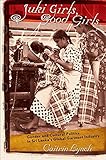Juki Girls, Good Girls : Gender and Cultural Politics in Sri Lanka's Global Garment Industry / Caitrin Lynch.
Material type: TextPublisher: Ithaca, NY : Cornell University Press, [2016]Copyright date: ©2016Description: 1 online resource (296 p.) : 6 halftonesContent type:
TextPublisher: Ithaca, NY : Cornell University Press, [2016]Copyright date: ©2016Description: 1 online resource (296 p.) : 6 halftonesContent type: - 9780801473623
- 9781501705007
- Globalization -- Social aspects -- Sri Lanka -- Case studies
- Sex role in the work environment -- Sri Lanka -- Case studies
- Sex role -- Sri Lanka -- Case studies
- Sexual division of labor -- Sri Lanka -- Case studies
- Women clothing workers -- Sri Lanka -- Case studies
- Asian Studies
- Gender Studies
- Labor History
- SOCIAL SCIENCE / Anthropology / Cultural & Social
- 331.4/8
- HD6073
- online - DeGruyter
- Issued also in print.
| Item type | Current library | Call number | URL | Status | Notes | Barcode | |
|---|---|---|---|---|---|---|---|
 eBook
eBook
|
Biblioteca "Angelicum" Pont. Univ. S.Tommaso d'Aquino Nuvola online | online - DeGruyter (Browse shelf(Opens below)) | Online access | Not for loan (Accesso limitato) | Accesso per gli utenti autorizzati / Access for authorized users | (dgr)9781501705007 |
Browsing Biblioteca "Angelicum" Pont. Univ. S.Tommaso d'Aquino shelves, Shelving location: Nuvola online Close shelf browser (Hides shelf browser)

|

|

|

|

|

|

|
||
| online - DeGruyter Geology in the Nineteenth Century : Changing Views of a Changing World / | online - DeGruyter Governing Academia : Who is in Charge at the Modern University? / | online - DeGruyter Red Brethren : The Brothertown and Stockbridge Indians and the Problem of Race in Early America / | online - DeGruyter Juki Girls, Good Girls : Gender and Cultural Politics in Sri Lanka's Global Garment Industry / | online - DeGruyter Immigrants in the Lands of Promise : Italians in Buenos Aires and New York City, 1870-1914 / | online - DeGruyter Breaking the Mold : Redesigning Work for Productive and Satisfying Lives / | online - DeGruyter Wonder and Science : Imagining Worlds in Early Modern Europe / |
Frontmatter -- CONTENTS -- Acknowledgments -- Introduction -- Rohini: Young Women and Garment Life -- 1. Globalization, Gender, and Labor -- Chinta -- 2. Localizing Production -- Mala: The Truth about Women Workers at Garment Factories -- 3. The Politics of White Women's Underwear -- Geeta -- 4. Juki Girls, Good Girls, and the Village Context -- Sita -- 5. The Good Girls of Sri Lankan Modernity -- Geeta: Untitled -- 6. Paternalism and Factory Conflicts -- Conclusion -- Glossary and Abbreviations -- Notes -- References -- Index
restricted access online access with authorization star
http://purl.org/coar/access_right/c_16ec
When a government program brought garment factories to rural Sri Lanka, women workers found themselves caught between the pressures of a globalizing economy and societal expectations that villages are sanctuaries of tradition. These women learned quickly to resist the characterization of "Juki girls"-female garment workers already established in the urban sector-as vulgar and deracinated, instead asserting that they were "good girls" who could embody the nation's highest ideals of femininity. Caitrin Lynch shows how contemporary Sri Lankan women navigate a complex web of political, cultural, and socioeconomic forces. Drawing on extensive ethnographic research conducted inside export-oriented garment factories and a close examination of national policies intended to ease the way for globalization, Lynch details precisely how gender, nationalism, and globalization influence everyday life in Sri Lanka. This book includes autobiographical essays by garment workers about their efforts to attain the benefits of being seen as "good" while simultaneously expanding the definition of what sort of behavior constitutes appropriate conduct. These village garment workers struggled to reconcile the role thrust upon them as symbols of national progress with the negative public perception of factory workers. Lynch provides the context needed to appreciate the paradoxes that globalization creates while painting a sympathetic portrait of the individuals whose life stories appear in this book.
Issued also in print.
Mode of access: Internet via World Wide Web.
In English.
Description based on online resource; title from PDF title page (publisher's Web site, viewed 02. Mrz 2022)


